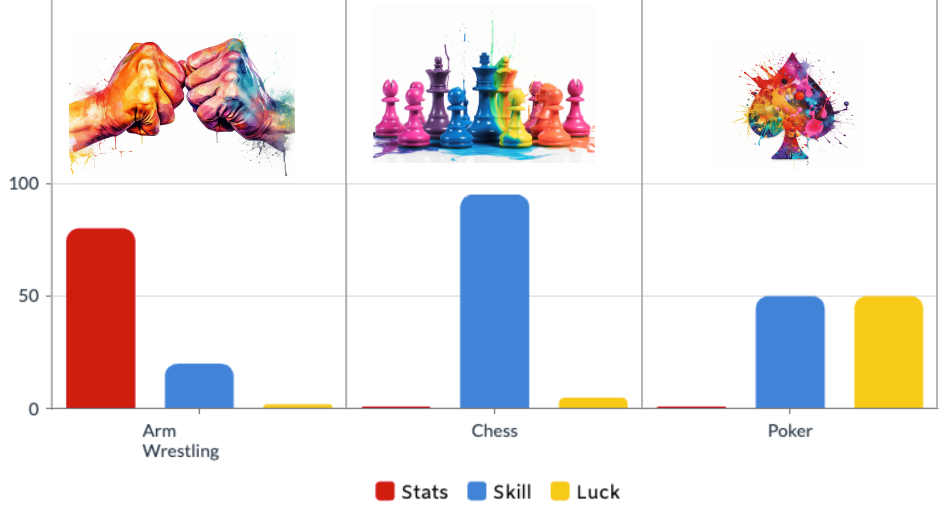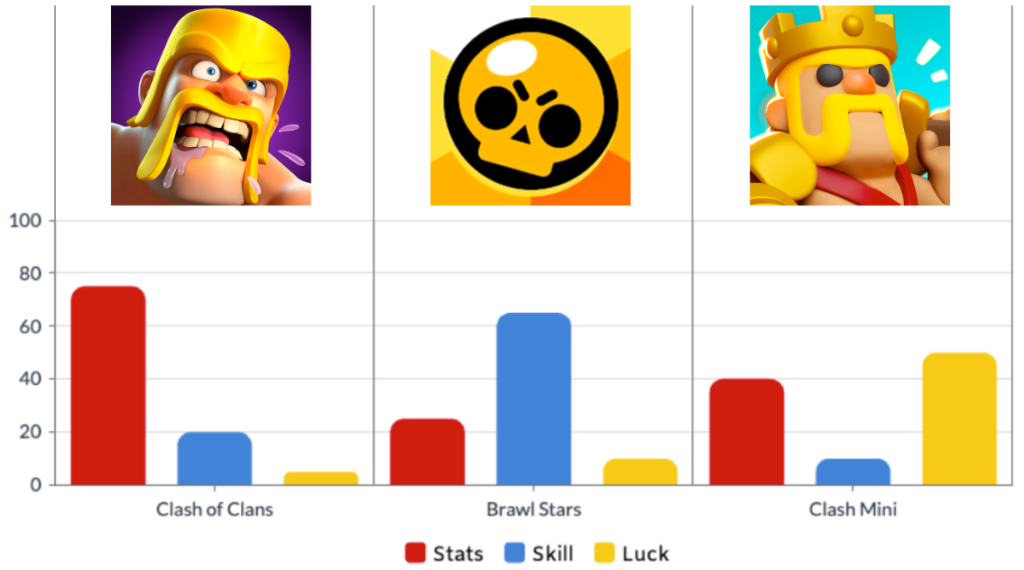Recently, Clash Mini has become a hot topic in the gaming world. Anticipation has been building, with Supercell hinting towards a global release of the game. Javier Barnes, an industry-acclaimed Product Manager, recently penned an insightful article via Deconstructor of Fun, dissecting the game’s features and comparing early data against other hits. His prediction? Clash Mini won’t hit the global stage anytime soon.
Arriving at a similar conclusion, I approached the analysis from a slightly different angle: Product Design. In my understanding, Product Design is the strategic alignment between the game genre and its design, with the target player motivations (see Quantic Foundry insights on Gamer Motivations).
Let’s dissect Clash Mini into its basic components to understand the harmony, or lack thereof, between these elements.
Game Genre: Auto Chess. This genre is characterized as an auto battler, often incorporating chess-like components. Players strategically position characters on a grid-like battlefield during a preparatory phase. These characters subsequently engage with the adversary’s team, all without further player intervention. Despite its initial surge in popularity following the Dota Auto-Chess release in early 2019, the genre has yet to birth a hit mobile title.
Game Design: Clash Mini adopted the Auto Chess genre and integrated it perfectly with the Clash IP, yet failing to introduce any significant twists to the core gameplay. They’ve created an excellent Auto Chess game.
Target Player Motivations: If there’s one thing Supercell is recognized for, it’s their knack for crafting competitive multiplayer games from simple, ingenious game designs, perfectly tailored to mobile limitations. They’ve earned the trust of midcore players seeking more than casual gaming experiences on mobile, primarily focusing on the Social – Multiplayer component.

Clash Mini is aiming to tread the same path as its predecessors. It’s simple, competitive, and well-suited to mobile. Yet, it falls short when it comes to engaging players for the long haul. Let’s delve into the details and uncover the reasons behind this shortcoming.
Deconstructing Competitive Game Design
Victory or defeat in any competitive experience hinges on three fundamental components:
- Stats: Defined as the level or power of your character or team.
- Skill: User ability involving dexterity, reaction time, or strategic thinking.
- Luck: Random elements inherent to the game.
Let’s examine three different non-digital competitive scenarios and how these components are balanced to determine victory:
- Arm Wrestling: Here, Stats, or in this case, the athlete’s physical strength, is the most crucial determinant of victory. While skill plays a role among competitors with similar levels of raw power, an untrained individual stands no chance against a well-trained one. Luck plays a negligible role.
- Chess: In chess, both players have equal stats (chess pieces and positioning) and luck plays a minimal role (especially in multiple games determining a match outcome). Skill emerges as the sole deciding factor for victory.
- Poker: Skill is undeniably important in poker to ensure consistent wins, but it remains a game of chance at its core. Even the most skilled players win only one of several tournaments they participate in. So, we can infer that luck accounts for at least 50% of the victory determining factor.

Similar structures are found in well-known mobile multiplayer titles. Let’s consider Supercell games as examples:
- Clash of Clans: In this game, power overshadows the other factors. While skill in town design and unit placement is significant, it’s impractical to attack a user one or two levels higher. Skill and luck play minor roles in determining victory or defeat.
- Brawl Stars: Contrary to Clash of Clans, Brawl Stars is heavily skill-dependent. The user must not only control two joysticks simultaneously but also manage ally and enemy positioning, character strengths or weaknesses, and other stage-related items (like Gems). Stats are important, but the gap isn’t insurmountable for skilled players. Luck also plays a minor role.
- Clash Mini: This game is the most luck-dependent among all Supercell games so far. Battles play out automatically without player input, the initial unit layout is semi-random since both you and the opponet will be shuffling board in between fights, and the units available for purchase is also an aleatory sub-selection of the team composition. Not to mention that if the opponent hero counters yours significantly then you know that the odds to win are very low. This makes Luck a prime determinant of victory, followed by Stats, and finally, Skill.

To comprehend the acceptable ratios of Skill, Power, and Luck in a competitive game let’s examine the evolution of successful games in this space.
The first generation of competitive games, such as Counter Strike, Starcraft, and DOTA, relied entirely on Skill. These games showcased that Skill alone can drive an exceptional competitive experience.
Power emerged later, particularly in mobile games, as a substitute for Skill. It allowed players to gain an advantage through superior equipment, earned either by extensive playtime or real-world purchases. This Pay to Win model found surprising acceptance among mobile gamers, indicating that Power and Stats can coexist in a competitive framework.
Luck, the final component, has its place in successful competitive experiences too, as games like Hearthstone and Fortnite demonstrate. However, no competitive games where Luck dominates completely exist outside of gambling scenarios. You probably can not imagine a serious tournament of Rock Paper Scissors, right?
The line, in my view, is drawn when the Luck element prevents players from learning from their losses. In competitive games, players should be able to assess their performance and identify areas for improvement.
Ultimately, the progression in competitive games is the ranking ladder. To progress, players must outperform their competitors at similar levels of stats / skills. Eventually, players stuck in the ladder will need to improve their skill, either by practicing, strategising or opening their wallet. A game based purely on Luck does not facilitate this growth, thus potentially leading to frustration among players who are driven by competitive motivations.

In the case of Clash Mini, it appears this line has been crossed. The auto chess nature of the game confines most decision-making to the spaces between fights. Despite the complexity of board positioning and unit selection, much of the final outcome relies on Luck, and the reasons for failure can often elude even top players.
So what’s next for Clash Mini? Here are two potential paths that I see:
- Iterate on the core gameplay significantly to diminish the Luck element. Keep up with its predecessors’ competitive spirit and ensure players aren’t frustrated by the mechanics.
- Adjust the audience, with different Player Motivations. Switch the focus from competitive players to a more casual audience. Many games with a high Luck factor have achieved tremendous success outside of the Competitive category. By transforming the gameplay experience and not let it revolt so much on win or defeat, Clash Mini could become an excellent casualized experience.
In conclusion, the analysis of Product Design has spotlighted a possible stumbling block in Clash Mini’s path to success. These issues ideally should be detected early in development, facilitating rapid course corrections or exploration of alternative opportunities. This proactive approach is a vital role for a Product Manager in the early stages of a game’s development. It can potentially steer us clear from launching products that may struggle to resonate with their intended audience.

TL;DR: Clash Mini, Supercell’s new game, might face challenges with its global release due to its inherent product design. The game, an Auto Chess genre, falls short on retaining and monetizing its players. A critical analysis based on three key components of competitive gaming – Stats, Skill, and Luck, reveals that Clash Mini may have an overemphasis on Luck, which often frustrates players seeking a genuinely competitive experience. The game could either revise its core gameplay to minimize the luck factor or shift its target audience to a more casual player base. Early identification of these issues is crucial in the game’s development process, demonstrating the significant role of a Product Manager.
